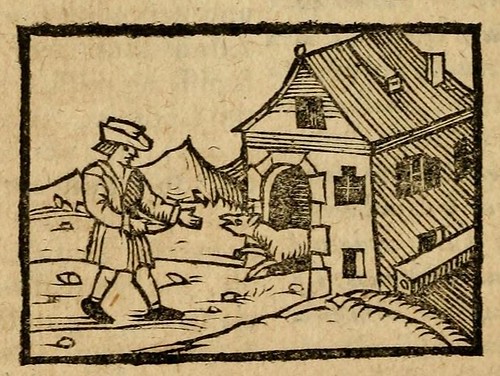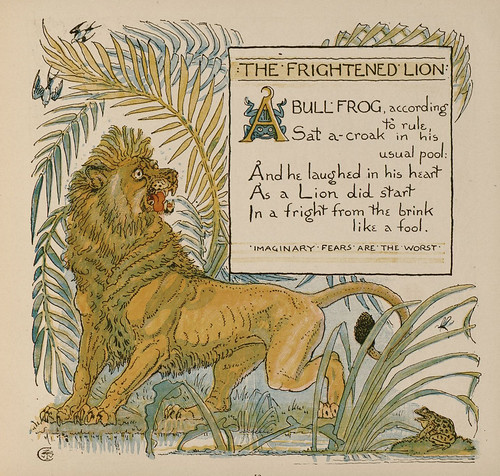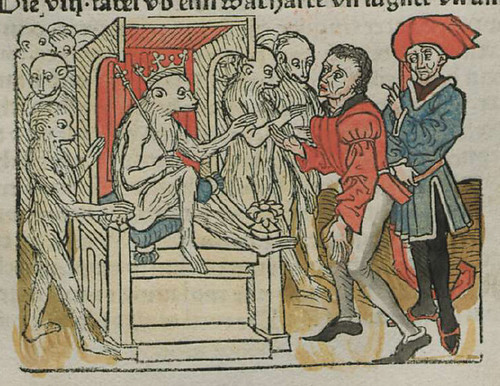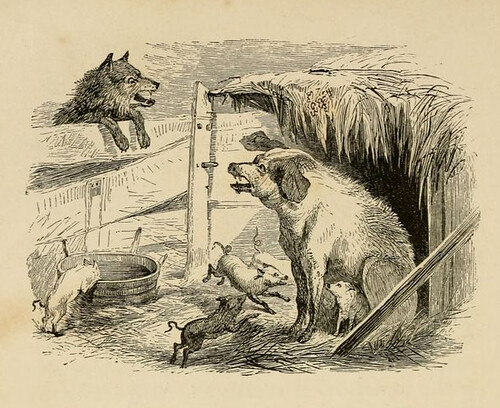The Dog and the Crocodiles
An ancient legend says that dogs who drank from the Nile had to do so on the run in order to escape the crocodiles. One day, a crocodile tried to trick a dog as he ran along the water's edge, taking little sips. "My dear dog," the crocodile said, "drink as much as you want; no need to hurry, no need to be afraid." The dog replied, "You can't fool me, crocodile! I might be tempted to stop and drink my fill, but I know you are waiting to gobble me up." Lesson learned: Don't waste your time with someone who is wise to you and your tricks; you'll be the one who ends up a fool.
(For a more literal translation, see Oxford Aesop 102.)

(Illustration by Griset.)
The Bees and the Beetles
The bees decided one day to invited the dung beetles to their home for a meal. The beetles agreed, and when they arrived, the bees offered them honey in the honeycomb to eat. The beetles only nibbled at the honeycomb, and then they flew away. To return the favor, the beetles invited the bees to dinner, and they heaped the table with platters of dung. The bees could not even eat so much as a bite, so they buzzed away back home. The dung beetles knew only carnal pleasures; the sweetness of the bees was beyond their comprehension.
(For a more literal translation, see Oxford Aesop 401.)
The Flying Beetle
There was once a beetle who lived in a dung heap. One day when he had eaten his fill, he crawled out from under the dung, looked up, and saw an eagle soaring high in the air, flying swiftly by. This made the beetle feel disgusted with himself and his way of life, so he said to the other beetles, "Do you see that eagle? He flies so quickly and he is so strong, with a sharp beak and deadly talons. He can rise up to the clouds or come racing back down to earth as he pleases. We beetles are so pathetic by comparison: we fly, but we're not birds, and we're not like the other bugs either. Yet when I raise my voice, it resounds like the eagle's cry, and I shine as brightly as the eagle does. No more dung heap for me! I am going to join the company of birds and fly together with them wherever they go, an equal in their ranks!" The beetle then flew upwards, letting forth a mighty cry that was actually just a nasty buzzing sound. He pursued the eagle high above the clouds, but the strong winds were too much for him, and he came crashing back to the ground, weak and shaken, far from the dung heap that was his home. Unable to find anything to eat, the little beetle lamented, "They can call me a bird or a bug, I don't care, just so long as I find my way back home to my dung heap!" Arrogance leads to disaster. If you pretend to be someone you are not, no one will respect you, and you will end up worse off than you were to begin with.
(For a more literal translation, see Oxford Aesop 332.)
Aesop and the Bow
There was an Athenian who saw Aesop shooting marbles with some boys in the street. He burst out laughing, thinking how foolish Aesop looked, an old man playing marbles — but Aesop makes fun of you; you don't make fun of Aesop. So when Aesop heard the Athenian laughing, he said nothing in reply but simply took an unstrung bow and put it down on the ground where the man could see it. Then he said, "Hey, Mr. Know-It-All, riddle me this: what does this bow mean?" Aesop's words got the people's attention, and a crowd gathered round. The Athenian was baffled; he thought and he thought, but he could not figure out the riddle, and finally he gave up. Having defeated the man in this battle of wits, Aesop then revealed the meaning of the bow. "If you have your bow tightly strung at all times, it will break. You need to let it rest sometimes so that it will be ready whenever you need it." The human mind is like that bow: it needs to relax every once in a while.
(For a more literal translation, see Oxford Aesop 537.)
(Illustration from Croxall's Aesop.)
The Dog and the Reeds
Beware the company you keep. There was once a dog who liked to poop in the reeds by the river. The reeds didn't like this at all, so one of them poked the dog in the butt. The dog jumped back and began to bark at the reeds, but the reed replied, "Bark all you want! I'd rather listen to you complain at a distance than have to smell your dirty business nearby."
(For a more literal translation, see Oxford Aesop 566.)
The Dog-Catcher and the Dog
There was a man who wanted to catch a dog, so he threw the dog some food, and then some more food, but the dog wouldn't budge. "I'm not coming anywhere near you," the dog explained. "Your excessive generosity warns me to be on my guard." If someone gives you extravagant gifts, they are probably trying to trick you.
(For a more literal translation, see Oxford Aesop 88.)

The Dog and the Lion
There was once a dog who was chasing a lion as fast as he could, but then the lion turned around and roared at the dog. That changed the dog's mind, and he ran off with his tail between his legs. The fox saw what had happened and said to the dog, "You silly creature! You were chasing after someone whose voice was enough to terrify you." Don't try to challenge someone more powerful than you are: you will fail in your pursuit, and you will be made fun as well.
(For a more literal translation, see Oxford Aesop 228.)
The Cowardly Lion
The lion had come to the river to take a drink when he heard a strange, rumbling sound. He looked around, but he could see no one. He stood there, listening, and then he heard the rumbling sound again, and he trembled with fear. At last he saw a bullfrog emerging from the river's waters. He realized it had been the frog making that sound all along, and so he crushed the frog beneath his paws. This fable is for someone who talks big but does nothing.
(For a translation from a classical source, see Oxford Aesop 270.)

(Illustration by Walter Crane.)
The Horse and the Goats
Sometimes you can see underlings who gossip about their boss; that is what this fable is about. There was once a horse who was being chased by a lion. Some goats saw the horse come running around the corner, and they made fun of him as he raced by, whereupon the horse replied, "You foolish creatures! You don't even realize who is chasing me. If you did, you would be even more scared than I am!" Higher-ups are often mocked by their ignorant inferiors.
(For a more literal translation, see Oxford Aesop 234.)
The Jar Who Went to Court
There was a woman from the ancient Greek city of Sybaris who broke a jar. The jar decided to take the woman to court, summoning witnesses to testify against her. The woman exclaimed, "What a foolish jar you are! You don't need a judge and jury; you need a plaster bandage to hold yourself together!"
(For a more literal translation, see Oxford Aesop 180.)
Jupiter and the Two Sacks
Jupiter, the ruler of gods and men, gives each person two sacks to carry. The first sack contains all your faults, and you wear that on your back. The second sack contains other people's faults, and that is the one that dangles in front of you, hanging around your neck. As a result, you find it easy to see other people's faults, but you cannot see your own.
(For a more literal translation, see Oxford Aesop 527.)
The Sow and the Wolf
A sow, about to give birth to her piglets, was lying on the ground, groaning. A wolf ran up and offered to be her midwife. The sow realized that the wolf was only trying to trick her, so she said in reply, "The best way to help me is to keep your distance." If the sow had trusted that wolf, things would have been twice as bad: in addition to the pains of giving birth, she would have felt the pain of her own death.
(For a more literal translation, see Oxford Aesop 311.)
(Illustration by Herrick.)
The Athenian
If a man in ancient Athens claimed to be a philosopher, he had to pass a test: the Athenians would whip the man violently, and if he endured the whipping in silence, then they would declare him to be a true philosopher. There was once a man who presented himself for the test. The people whipped him, and as soon as the whipping stopped, but before judgment was passed, the man exclaimed, "I am exceedingly worthy of being called a philosopher!" One of the Athenians then shook his head and said, "That might have been the case, if only you had kept your mouth shut and waited for our judgment."
(For a more literal translation, see Jacobs Odo 104.)
The Weeping Man and the Birds
You need to beware of hypocritical politicians, as this fable shows. There was a man who used bird lime for catching birds, and the bird lime made his eyes water. As he was killing the birds he had caught, one of the birds remarked, "Look at that man! He is so good and pious." Another bird asked, "How can you tell?" And the first bird said, "Don't you see his tears? He is weeping with pity." A third bird chimed in, "And don't you see his wicked actions? A curse upon that man and his tears: he is weeping while he slaughters us." So it is with the mighty men who go to church and pray and give money, weeping piously all the while. Yet they exploit and slaughter the poor and those less fortunate than themselves. The prayers and tears of men like that are an abomination.
(For a more literal translation, see Jacobs Odo 15; see also Oxford Aesop 297.)
The Goat and the Ass
This fable exposes those who have no respect for their superiors. There was once a goat who was the servant of an ass. The goat saw that the ass was simple-minded and unassuming, so he he decided to climb up on the ass and take a ride. The ass got angry and made himself fall over backwards, crushing the goat and killing him. The ass then got up off the ground and said, "Just because your boss is an ass, don't assume you can ride him." The same is true if you work for someone who is foolish or slow or old: be careful not to mock them, or else you might end up like the goat.
(For a more literal translation, see Jacobs Odo 107.)
The Two Monks
There were two monks who were on a journey, and along the way they came to a monastery. One of the monks, an inveterate liar, exclaimed, "Let's make a bet! By telling lies, I will be able to make more profit here than you and your truth-telling." The other monk, who always told the truth, agreed to the wager. They then went into the monastery, only to find that it was full of apes. The liar saluted the community of apes, and the abbot of the apes inquired, "What do you think of me and my brethren?" The liar replied, "I have never seen a religious community so fair as this one. As I gaze upon you, I realize that men are not superior to apes, but the other way around: you apes are the ideal to which we should aspire." And so he continued to praise the apes, and the apes, greatly pleased, gave him gold and silver and other precious gifts. Then the abbot of the apes asked the other man, "What do you think of me and my brethren?" The monk replied truthfully, saying, "I have never seen a congregation that looked so ridiculous or smelled so bad." The apes grew angry and attacked the man, beating him so badly that he barely escaped with his life. Telling the truth can be a risky business.
(For a more literal translation, see Jacobs Odo 41; see also Oxford Aesop 108.)

(Steinhowel, not set in a monastery like Aesop)
CC0. I free my work of copyright restrictions.
References:
Aesop's Fables. A new translation by Laura Gibbs. Oxford University Press, 2002.
The Fables of Odo of Cheriton, translated by John Jacobs. Syracuse University Press, 1984.


